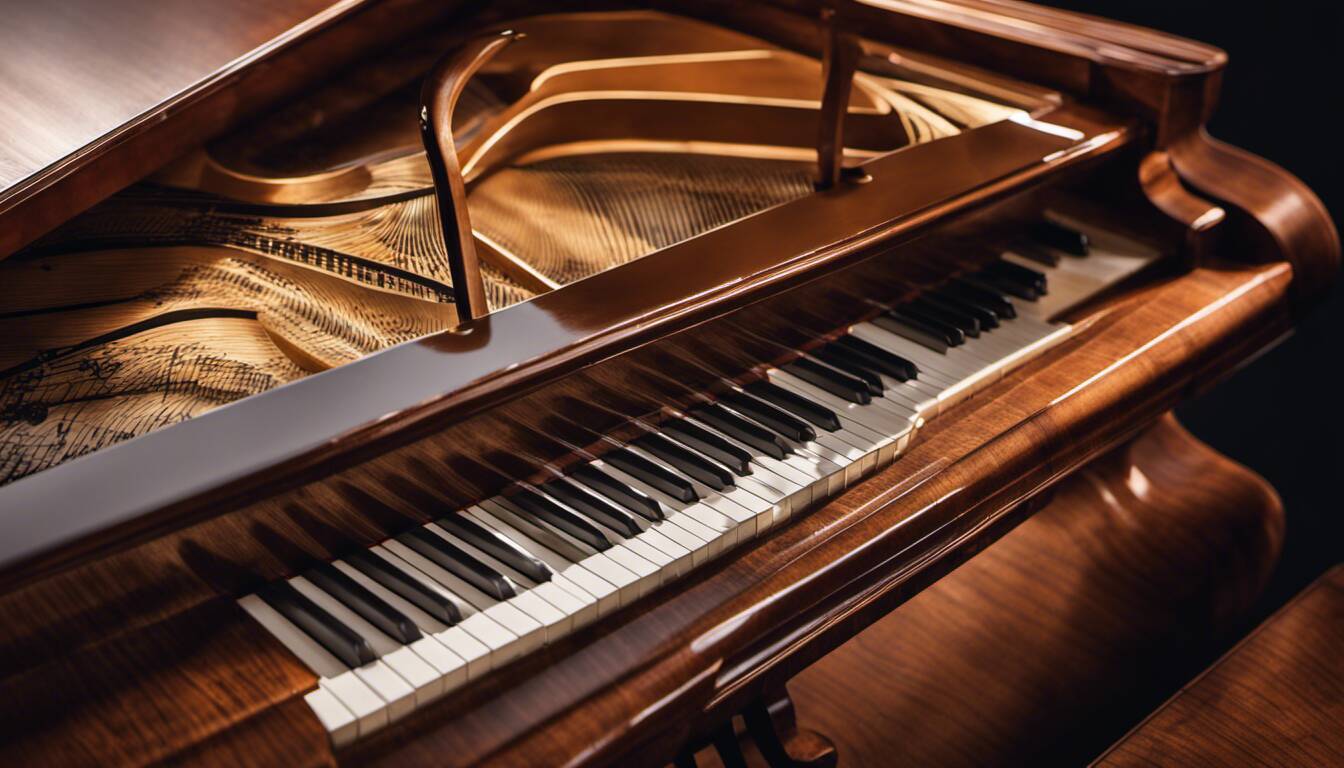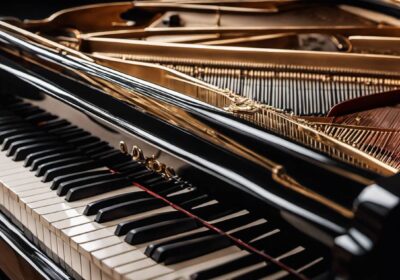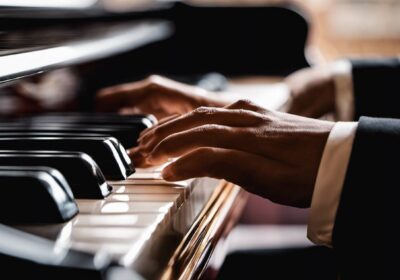Your piano may be an elegant piece of furniture gathering dust in the corner of your living room. But did you know it can also be the key that unlocks a world of unexplored musical potential? With ample and regular practice, you can transform those monotonous scales into masterpieces of music. In this post, we’ll delve into why practicing piano is so integral to your musical evolution, and how it can weave magic into an ordinary day. So whether you’re an aspiring virtuoso or simply a music enthusiast, keep reading to discover just how much your piano has to offer!
Practicing piano is crucial for developing technical skills, building musical repertoire, and enhancing overall musicianship. Through consistent practice, pianists can improve their finger dexterity, muscle memory, hand-eye coordination, rhythm, and dynamics. More importantly, piano practice enables one to express oneself through music and achieve personal fulfillment. Even a few minutes of regular practice each day can lead to significant progress over time.
The Impact of Piano Studies
When it comes to unlocking your musical potential, piano studies can have a profound impact. Learning to play the piano goes far beyond the development of musical skills; it also has far-reaching benefits for personal growth and cognitive abilities. Whether you’re a beginner or an advanced player, dedicating time to practicing the piano can yield tremendous results in multiple aspects of your life.
- A 2013 study from Northwestern University, discovered that musicians are found to have superior working memory compared to non-musicians, suggesting that piano practice can improve cognitive function.
- Another study stated that music training (playing an instrument like the piano) may speed up brain development in children, particularly in areas responsible for speech, reading skills, and sound processing.
- According to a 2017 study published in Frontiers in Psychology, practicing piano can also reduce stress and anxiety; a regular routine resulted in lowered cortisol levels among participants.
- Learning to play the piano not only develops musical skills but also has profound effects on personal growth and cognitive abilities. Even for beginners or advanced players, practicing the piano regularly can yield tremendous results in multiple aspects of life.
Enhancing Cognitive Abilities
Engaging in regular practice sessions not only sharpens your musical skills but also enhances cognitive abilities. Numerous studies have demonstrated the positive effects of playing the piano on brain function. Playing an instrument like the piano requires coordination between both hands, reading sheet music, and deciphering complex rhythms. These activities stimulate and strengthen neural connections, leading to improved focus, attention to detail, memory retention, and problem-solving skills.
For instance, imagine struggling to memorize a difficult passage in a piano piece. Through diligent practice and repetition, you build mental resilience that transcends the realm of music. This transferable skill can then be applied to other areas of your life, such as studying for exams or tackling challenging work projects.
Moreover, learning to play the piano involves deciphering written notation into physical movements on the keys. This process activates different areas of the brain responsible for visual processing, hand-eye coordination, and motor skills. Over time, these neural pathways become more efficient and interconnected, leading to improved dexterity and multitasking abilities.
Music is known to evoke emotions and touch people’s hearts. When playing the piano, you tap into your expressive side and learn how to communicate complex emotions through musical interpretation. This emotional connection fosters empathy and creativity in all aspects of your life.
In addition to enhancing cognitive abilities, piano studies are also instrumental in cultivating discipline and patience – qualities that serve as valuable assets beyond the realm of music.
Cultivation of Discipline and Patience
Learning to play the piano requires time, dedication, and most importantly, discipline and patience. These qualities are not only essential for mastering the instrument but also have far-reaching benefits in various aspects of life. In the process of learning to play the piano, you develop discipline by committing to a regular practice routine, setting goals, and holding yourself accountable. It takes patience to navigate through challenges, such as coordinating both hands or deciphering complex musical notation. Embracing these virtues cultivates a strong work ethic, resilience, and the ability to persevere in the face of difficulties.
Consider the story of Sophia, a teenager who decided to learn the piano. At first, she found it frustrating to coordinate her fingers on the keys and understand musical concepts. However, through consistent practice and a determination to improve, she developed discipline and patience. Over time, her progress showed remarkable improvement, not just in her piano skills but also in other areas of her life. She learned the value of perseverance and how small steps each day can lead to significant accomplishments.
Diverse Piano Training Approaches
Piano training is not limited to a single approach or style. In fact, there are various methods and techniques that cater to different interests and learning preferences. Whether you prefer classical music or want to explore jazz, pop, or even compose your own music, there is an array of diverse piano training approaches available.
Let’s take a closer look at some examples of these diverse piano training approaches:
- Classical Approach: The classical approach focuses on developing technical proficiency through practicing scales, arpeggios, and classical repertoire. It emphasizes precision and interpretation of composers’ intentions from different periods of classical music history.
- Jazz Approach: Jazz offers a unique set of techniques where improvisation becomes a central focus. Learning jazz enables pianists to explore chord progressions, improvisational skills, and syncopated rhythms.
For example, imagine Emily, a pianist with a passion for jazz. She enjoys the freedom to improvise and create her own interpretations of songs. By studying the jazz approach to piano, Emily has honed her ability to play in different keys, experiment with chord voicings, and develop a deep understanding of harmony.
- Pop Approach: The pop approach emphasizes learning popular songs from various genres and eras. It involves understanding chords, playing by ear, and incorporating contemporary techniques like harmonizing melodies.
John, a teenager fascinated by current chart-topping hits, decides to pursue a pop approach to piano training. Through this approach, he learns to accompany his favorite songs by ear and even starts composing his own melodies inspired by the music he loves.
- Composition and Songwriting: For those interested in creating their own music, focusing on composition and songwriting provides an avenue for self-expression. This approach encourages exploration of melody, harmony, rhythm, and structure.
Imagine Hannah, a musician who aspires to write her own piano compositions. By delving into composition-focused piano training, she learns how to craft captivating melodies, construct harmonies that evoke emotions, and experiment with unique textures. This approach allows her to express her creativity fully while developing her technical skills.
By embracing diverse piano training approaches tailored to your interests and goals, you can not only acquire a well-rounded musical education but also nurture a deeper connection with the instrument.
Optimizing Piano Training Sessions
When it comes to piano training, optimizing your practice sessions is crucial for unlocking your full musical potential. Rather than mindlessly playing through pieces or exercises, it’s important to approach each session with intention and focus. One key aspect of optimizing your sessions is to set specific goals for what you want to achieve during that practice time. Whether it’s mastering a tricky section of a piece or improving your technique on certain scales, having clear objectives helps keep you engaged and motivated.
Another strategy for optimizing piano training sessions is to break down your practice time into smaller, manageable chunks. Instead of attempting to practice for hours on end in one sitting, consider dividing your practice into shorter sessions throughout the day. This allows for better concentration and retention of information. Additionally, taking short breaks between practice segments can help prevent mental fatigue and maintain overall productivity.
Efficient Time Management Strategies
Efficient time management is essential when it comes to piano training. With busy schedules and various commitments, finding dedicated time for practice can be challenging. However, by implementing effective time management strategies, you can make the most out of the time you have and maximize your progress.
One strategy is to establish a consistent practice routine. By setting aside specific times each day or week for piano practice, you create a habit that becomes ingrained in your schedule. This consistency helps ensure that practicing the piano becomes a non-negotiable part of your daily life.
Another efficient time management strategy is prioritization. Assessing your available time and prioritizing tasks based on importance and urgency can help you allocate dedicated periods for piano practice. It may require sacrificing less essential activities or adjusting your schedule, but the rewards in terms of skill development will be worth it.
It can also be helpful to utilize technology and tools to aid in time management. Utilize apps or reminders to keep track of your practice schedules and set goals for each session. These digital tools can provide structure and accountability, helping you stay on track and make the most efficient use of your practice time.
Ultimately, efficient time management allows you to make consistent progress in your piano playing journey, even within limited time constraints. By optimizing your practice sessions and implementing effective strategies, you can unlock your full musical potential and achieve your goals as a pianist.
Unlocking Creativity through Musical Exploration
Playing the piano offers a rich and diverse world of musical exploration, allowing us to unlock our creativity and delve into endless possibilities. Through exploring different styles, genres, and techniques, we expand our musical understanding and tap into our unique creative potential.
When we embark on this journey of musical exploration, we are exposed to a wealth of diverse sounds and rhythms that spark our curiosity and imagination. We can experiment with various musical styles such as classical, jazz, pop, or even fusion genres that blend elements from different traditions. Each style offers its own set of techniques, harmonies, and expressive qualities that allow us to express ourselves in new and exciting ways.
For instance, consider a classically trained pianist who decides to explore jazz piano. By delving into the world of jazz improvisation and learning about chord voicings, scales, and rhythmic patterns commonly used in jazz music, they begin to develop a new set of skills that enhances their overall musicianship. They find themselves embracing spontaneity and freedom in their playing as they explore new melodic ideas and harmonies.
Just like an artist with a wide palette of colors at their disposal, exploring different musical styles is like adding new hues to our artistic expression. The more colors we have to choose from, the greater the range of emotions we can convey through our music.
But it’s not just about trying different styles; it’s also about pushing the boundaries within each style. Musical exploration allows us to experiment with alternative arrangements or interpretations of familiar pieces, adding our unique touch to them. It encourages us to look beyond the written notes on the page and infuse our personal interpretation into every performance.
Moreover, musical exploration fosters creative thinking by helping us develop skills like improvisation and composition. When we improvise on the piano, we tap into our intuition and let the music flow freely from our inner musical voice. It’s a form of spontaneous creation that encourages us to trust our instincts and embrace the unexpected.
Imagine sitting down at the piano with no sheet music in front of you, allowing your fingers to explore the keys and create melodies in real-time. With each improvisation session, you become more fluent in expressing your musical ideas, developing a unique improvisational style that is entirely your own.
Some may argue that creativity is an innate talent and cannot be learned or developed through exploration. While it’s true that some individuals may have a natural inclination towards creativity, everyone has the capacity to nurture and enhance their creative abilities through deliberate practice and exposure to new experiences. Musical exploration provides the platform for such growth by immersing ourselves in a world of diverse musical influences.
In conclusion, unlocking our creativity through musical exploration opens up a world of possibilities on the piano. By exploring different styles, pushing boundaries, and developing skills like improvisation and composition, we expand our musical horizons and tap into our unique creative potential. So let us embrace this journey of exploration and see where it takes us on our path to unlocking our full musical potential.




